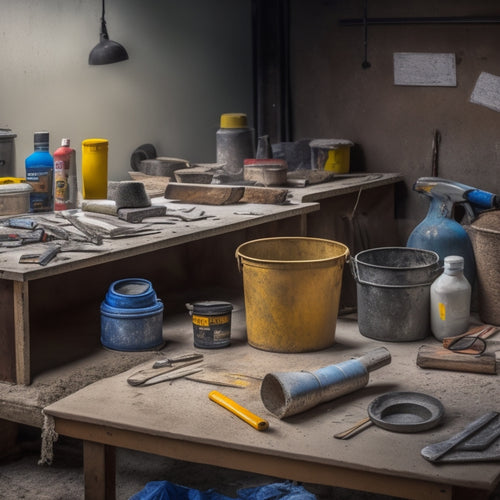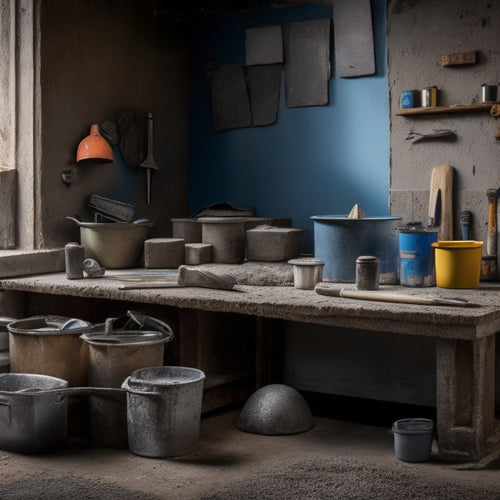
Why DIY Concrete Adhesion Tools Cost So Much
Share
You pay a premium for DIY concrete adhesion tools because they're built with high-quality materials, precision-engineered for superior performance and durability. These tools boast specialized features, like adjustable handles and LED lights, that enhance their functionality and versatility. Reputable brands invest heavily in research and development, testing, and refinement, which drives up costs. Additionally, limited production capacity and high demand contribute to the higher price point. It's clear that the cost of these tools is a result of careful consideration and attention to detail - and there's more to uncover behind the price tag that justifies the investment.
Key Takeaways
• High-quality materials and advanced manufacturing techniques ensure superior durability and performance, increasing tool cost.
• Specialized features like adjustable handles, LED lights, and quick-release mechanisms enhance performance and versatility, adding to the expense.
• Established brands invest heavily in research and development, marketing, and quality control, resulting in higher prices for their products.
• Limited production capacity and high demand drive up costs, making it difficult for manufacturers to reduce prices.
• Significant investments in research and development, including product testing and refinement, contribute to the higher cost of DIY concrete adhesion tools.
High-Quality Materials and Manufacturing
What sets high-quality DIY concrete adhesion tools apart from their lower-cost counterparts is the use of premium materials and advanced manufacturing processes.
When you invest in a high-end tool, you're not just paying for a brand name - you're paying for the superior material durability that guarantees your tool can withstand the rigors of repeated use.
The best manufacturers select materials that can resist corrosion, abrasion, and extreme temperatures, assuring that your tool remains reliable and efficient over time.
Advanced manufacturing techniques also play an essential role in producing high-quality tools. Sophisticated machining processes, precision engineering, and strict quality control measures all contribute to a tool that's built to last.
You'll notice the difference in the tool's performance, as it delivers consistent results and requires less maintenance.
Specialized Features and Functionality
As you evaluate DIY concrete adhesion tools, you'll find that high-end models often boast specialized features and functionality that set them apart from more basic alternatives. These advanced features greatly enhance the user experience, making it easier to achieve professional-grade results.
| Feature | Description |
|---|---|
| Adjustable Handle | Allows for customizable grip and ergonomic comfort, reducing fatigue during extended use. |
| Multi-Surface Capability | Enables the tool to adapt to various concrete surfaces, including rough, smooth, and irregular surfaces. |
| LED Light Integration | Illuminates the work area, improving visibility and accuracy in low-light environments. |
| Quick-Release Mechanism | Facilitates effortless tool bit changes, saving time and increasing tool versatility. |
These features not only improve the overall performance of the tool but also increase its versatility, allowing you to tackle a wider range of projects with confidence. By investing in a high-end DIY concrete adhesion tool, you'll experience a considerable upgrade in performance, precision, and convenience.
Brand Reputation and Marketing
When selecting a DIY concrete adhesion tool, you're not just buying a product - you're investing in a brand's reputation, expertise, and commitment to quality, all of which impact the tool's performance and your overall satisfaction.
A reputable brand's marketing efforts focus on building trust and credibility, which translates to a higher price point. You're paying for the assurance that the tool will deliver consistent results, backed by a company that stands behind its product.
Brand loyalty is a significant factor in the cost of DIY concrete adhesion tools. Established brands have invested heavily in creating a loyal customer base, which drives consumer perception of their products as high-quality and reliable.
This loyalty is built through effective marketing strategies, such as targeted advertising, influencer partnerships, and customer testimonials. As a result, you're more likely to choose a well-known brand over a generic or unknown alternative, even if it means paying a premium.
The perceived value of a reputable brand's product outweighs the cost savings of a lower-priced option, making brand reputation and marketing a significant contributor to the overall cost of DIY concrete adhesion tools.
Research and Development Costs
You'll also pay for the research and development that goes into creating a high-performance DIY concrete adhesion tool, as manufacturers invest heavily in testing and refining their products to confirm they meet your specific needs and expectations. This process involves significant investments in innovative techniques, advanced materials, and rigorous testing procedures to guarantee the tool's performance, safety, and durability.
Some of the key areas where manufacturers focus their R&D efforts include:
-
Developing proprietary adhesion formulas that can bond with various types of concrete
-
Designing ergonomic handles and grips that reduce fatigue and improve control
-
Creating precision-machined components that guarantee accurate and consistent results
- Conducting extensive field testing and simulation analysis to validate product performance under diverse environmental conditions
These efforts result in products that aren't only effective but also reliable, efficient, and easy to use.
As a consumer, you reap the benefits of this R&D investment when you purchase a high-quality DIY concrete adhesion tool that helps you achieve professional-grade results.
Limited Economies of Scale
Manufacturers of DIY concrete adhesion tools face limited economies of scale, which drives up production costs and, subsequently, the prices you pay. This means they can't take advantage of bulk production and reduce costs per unit. As a result, you, the consumer, bear the brunt of these increased costs.
| Production Capacity | Market Demand |
|---|---|
| Low | Low |
| Medium | High |
| High | Very High |
Limited economies of scale occur when manufacturers can't produce enough tools to meet market demand. This limits their ability to reduce production costs, leading to higher prices for you. For instance, if a manufacturer has a low production capacity (e.g., 100 units per month) and market demand is high (e.g., 1000 units per month), they can't produce enough tools to meet demand, resulting in higher prices. Conversely, if production capacity is high (e.g., 1000 units per month) and market demand is low (e.g., 100 units per month), they can't reduce production costs, leading to higher prices. This limited economies of scale issue contributes greatly to the high cost of DIY concrete adhesion tools.
Frequently Asked Questions
Are DIY Concrete Adhesion Tools Available for Rent or Lease?
When you're looking for DIY concrete adhesion tools, you're likely wondering if rental options or leasing agreements are available.
The good news is that yes, you can rent or lease these specialized tools. This approach can be cost-effective, especially for one-time or infrequent projects.
You'll find companies offering flexible rental periods and leasing agreements that cater to your needs.
Research and compare options to find the best fit for your project's requirements and budget.
Can I Use a DIY Tool on Multiple Concrete Types?
Did you know that 75% of DIY concrete adhesion projects fail due to inadequate surface preparation?
You're wise to wonder if you can use a DIY tool on multiple concrete types. However, concrete surface compatibility is a major concern.
Tool versatility concerns arise when dealing with varying concrete densities, porosities, and surface textures.
To guarantee success, you'll need to carefully assess the tool's specifications and adjust your approach accordingly, taking into account the unique requirements of each concrete type.
Do DIY Concrete Adhesion Tools Require Special Storage?
When you invest in a DIY concrete adhesion tool, you'll need to take into account special storage conditions to maintain its effectiveness.
You'll want to store it in a dry, cool place, away from direct sunlight and moisture.
Regular cleaning and lubrication are also vital to meet the maintenance requirements.
Are DIY Concrete Adhesion Tools Compatible With Other Tools?
'When in Rome, do as the Romans do' - in this case, mastering DIY concrete adhesion tools.
You'll find that these tools aren't one-size-fits-all; their compatibility with other tools depends on the adhesion technique you're using.
For instance, a tool designed for epoxy-based adhesives mightn't work with polyurethane-based ones.
Be prepared to invest in tools specific to your technique, as mixing and matching can lead to subpar results.
Can I Repair a DIY Concrete Adhesion Tool Myself?
When you're faced with a malfunctioning DIY concrete adhesion tool, you're likely wondering if you can repair it yourself.
The answer is yes, but it's essential to assess the issue first. Determine the root cause and research repair techniques specific to your tool.
Then, conduct a cost analysis to decide whether repairing or replacing is more cost-effective.
With the right approach, you can fix your tool and get back to work efficiently.
Conclusion
As you weigh the cost of DIY concrete adhesion tools, remember that high-quality materials, specialized features, and brand reputation come at a price.
Research and development costs, combined with limited economies of scale, drive up the cost.
For instance, a premium brand like Hilti invests heavily in R&D, resulting in tools like their SFH 18-A CPC, a high-torque hammer drill with advanced dust removal, priced around $1,000.
This level of innovation and performance comes at a cost, making it a significant investment for professionals and serious DIYers.
Related Posts
-

3 Best Tools to Buy for Concrete Repair Online
When buying tools for concrete repair online, you'll want to research multiple retailer options to find the best prod...
-

Top Tools for Beginners in Concrete Masonry Coating
You're about to begin a concrete masonry coating project, and having the right tools is essential. Start with essenti...
-

Must-Have Tools for Concrete Planter Projects
As you commence your concrete planter project, you'll need a range of specialized tools to achieve professional-grade...


